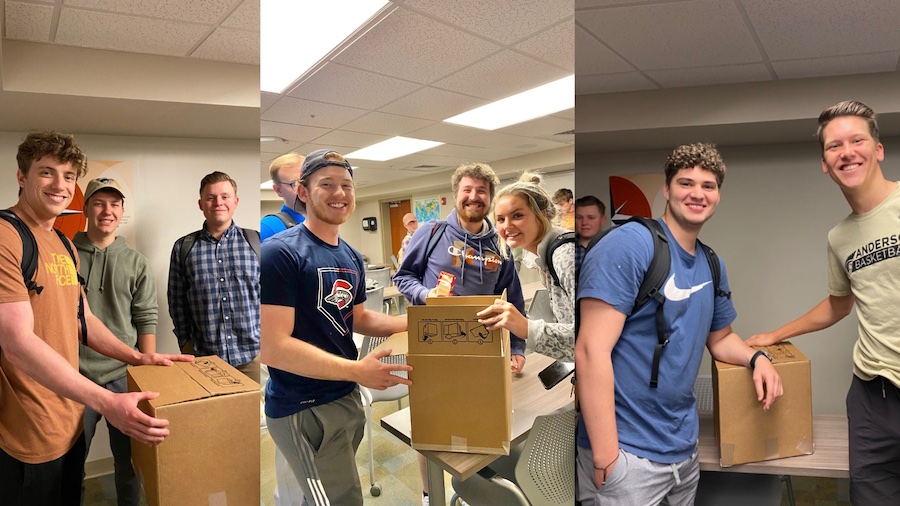Missionaries serving God in other parts of the world often miss items they once took for granted while living stateside.
With that in mind, Dr. Kim Whitehead, professor of supply chain management in the Anderson University College of Business, developed the Great Package Race.
Dr. Whitehead, who came to Anderson University with a wealth of experience from major manufacturing companies, thought a competition between student teams would heighten interest and expose them to the real world of logistics, learning problem-solving skills along the way. At the same time, missionaries get to open packages filled with welcome reminders of home.
“This is the first time we’re serving an AU alum in the mission field and the students are super excited this year, because they really connect with him. He’s just graduated and hasn’t been there very long, so they feel good about being able to send something to him,” Dr. Whitehead said. “All of this textbook stuff, doing problems… you’re not going to remember that one homework, but you’re going to remember this and what you learned from it, and hopefully that makes connections back to other things that they learned in their program, and that’s what it’s all about.”
The first Great Package Race was organized in 2019 with student teams sending packages to a missionary in Zambia. Then the Great Package Race skipped a year because of the COVID pandemic. The following year, packages were sent to a missionary family in Italy. In 2022, a package was sent to a missionary serving college students in Zambia.
This past fall, project management students picked a missionary in Asia who would receive the package of items they requested, and they chose another missionary as a backup. Dr. Whitehead explained that sometimes a missionary might not stay in the same location, making a Plan B necessary. During the spring semester, logistics students carry out the packaging and delivery.
The missionary requested snacks and personal care items, as well as Bibles and items from AU Outfitters.
Sending packages is about more than just staying on budget. Each country has its own customs hurdles to jump over—some items simply can’t be accepted. Also, shippers are different from one another.
Ashley Anna Hicks was excited to be helping out a missionary who was a recent graduate and one of her classmates last year. Hicks, who was unfamiliar with DHL before the project, says she learned a lot about dealing with another country’s customs and working with her team.
“We definitely had to collaborate as a class and work with the different teams. We wanted to send the exact same package to him. We wanted it to be the same weight, all the materials were the same, so there was nothing unfair about it,” Hicks said.
A key takeaway for Chris Lunsford and his UPS team was learning how to plan for the worst.
“You need to have a backup of what to do if it doesn’t work. Plan for the worst, always have a second option,” Lunsford said. “We went to a UPS that was just down the road from Anderson University and they didn’t accept it. They said there were high tariffs. Apparently some of my group mates said they thought the people didn’t want to deal with it. We went to a bigger UPS hub in Anderson and they accepted it. We asked them about the tariffs, they had no idea.”
“Not only are we able to help a missionary get some of home on the field, but we’re also able to help a former AU student who was here this time last year, so is fairly new out on the field,” said Jeremy Hudson, leader of the FedEx team.
Here’s how things turned out.
The DHL team’s package got to its destination first. It arrived on the same day as UPS, despite taking a completely different path around the world. The package from the FedEx team made it to its destination country, but hadn’t yet been delivered to the recipient at the time of this writing.
Student teams are as follows:
Team DHL, led by Ashley Anna Hicks: Michael Boylston, Carson Jones, Sullivan Reames, Morgan Scott and Eli Spires.
Team FedEx, led by Jeremy Hudson: Camryn Conner, Walker Gilmore, Walker Kirkpatrick, Jarrett McCurry and Nathaniel Mulcahy.
Team UPS, led by Chris Lunsford: Aidan Rechin, Ethan Stalnecker, Anthony Pandolfi, Blake McDaniel, Santiago Alvarez and Dylan Tyler.
The Supply Chain program is one of several degree programs offered by the Anderson University College of Business. College of Business graduates work in Fortune 500 companies, small to medium businesses and nonprofits, performing functions from management to marketing. The Anderson University College of Business is accredited by the Accreditation Council for Business Schools and Programs (ACBSP). More information can be found online.

